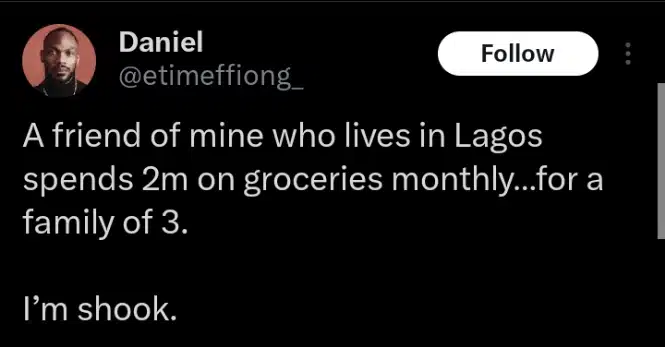- Daniel Etim Effiong Shocked as Friend Spends N2M Monthly on Groceries, highlighting the staggering amounts some individuals allocate for basic needs.
- The revelation has sparked widespread discussion about financial habits and priorities among friends and peers.
- Public reactions reveal a mix of disbelief and concern over wealth disparities, prompting conversations about economic inequality.
- Grocery expenses in Lagos are significantly higher than in other regions, contributing to the overall cost of living in the city.
- Social media influences perceptions around wealth and consumer behavior, shaping how people view spending and lifestyle choices.
Newsypeople – Daniel Etim Effiong, a prominent figure in Nollywood, recently stirred conversations online when he disclosed that a friend of his spends an astonishing N2 million monthly on groceries for a family of three.
This revelation, shared via social media, has not only raised eyebrows but also ignited a broader discussion about the cost of living, wealth distribution, and societal expectations in Nigeria, particularly in urban centers like Lagos.

The actor’s candid admission reflects a growing trend where personal finances and lifestyle choices are increasingly scrutinized in public forums. As more individuals share their financial habits, it becomes essential to understand the implications of such disclosures within the context of economic realities faced by many Nigerians today.
In his post, Daniel Etim Effiong expressed his shock at the extravagant grocery expenditure, stating:
“A friend of mine who lives in Lagos spends 2m on groceries monthly…for a family of 3. I’m shook.”
This statement not only highlights the staggering amount spent but also raises questions about what constitutes reasonable spending for essential items like food.
Such a figure can be alarming to many, especially considering that it represents a significant portion of an average Nigerian’s annual income. The implication here is profound; it suggests a disparity between different socioeconomic classes within Nigeria, where some can afford lavish lifestyles while others struggle to meet basic needs.
The reaction to Effiong’s post was swift and varied across social media platforms. Many users expressed disbelief and concern over such high spending on groceries, while others defended the right to spend as one sees fit if they have the means. This dichotomy reflects broader societal attitudes towards wealth and consumption.

Some commenters pointed out that such revelations could lead to unrealistic expectations among those who aspire to similar lifestyles without understanding the economic realities involved. Others viewed it as a reflection of the increasing divide between different social classes in Nigeria, prompting discussions about wealth inequality and consumerism.
Lagos is known for its high cost of living, which significantly impacts grocery prices. The city’s bustling markets and supermarkets often reflect prices that can be daunting for an average family. A breakdown of typical grocery expenses reveals that families often spend substantial amounts on basic necessities, but N2 million monthly is an outlier that suggests either excessive consumption or premium purchasing decisions.
For context, a typical family might spend anywhere from N100,000 to N300,000 monthly on groceries depending on their dietary preferences and lifestyle choices. The stark difference highlighted by Effiong’s friend’s spending raises questions about what constitutes normalcy in grocery expenditures within urban Nigerian households.
Social media plays a pivotal role in shaping public perception around wealth and lifestyle choices. Platforms like X (formerly Twitter) allow individuals to share personal experiences and financial habits with vast audiences, often leading to discussions that transcend individual stories.
The rapid sharing and commenting culture can amplify certain narratives while diminishing others, creating an environment where extravagant spending might be normalized or critiqued based on community standards. In this case, Effiong’s comment serves as a catalyst for discussions about what it means to live well in Nigeria today.
Also Read: Cubana Chief Priest Donates Food and Cash to Widows and Disabled



